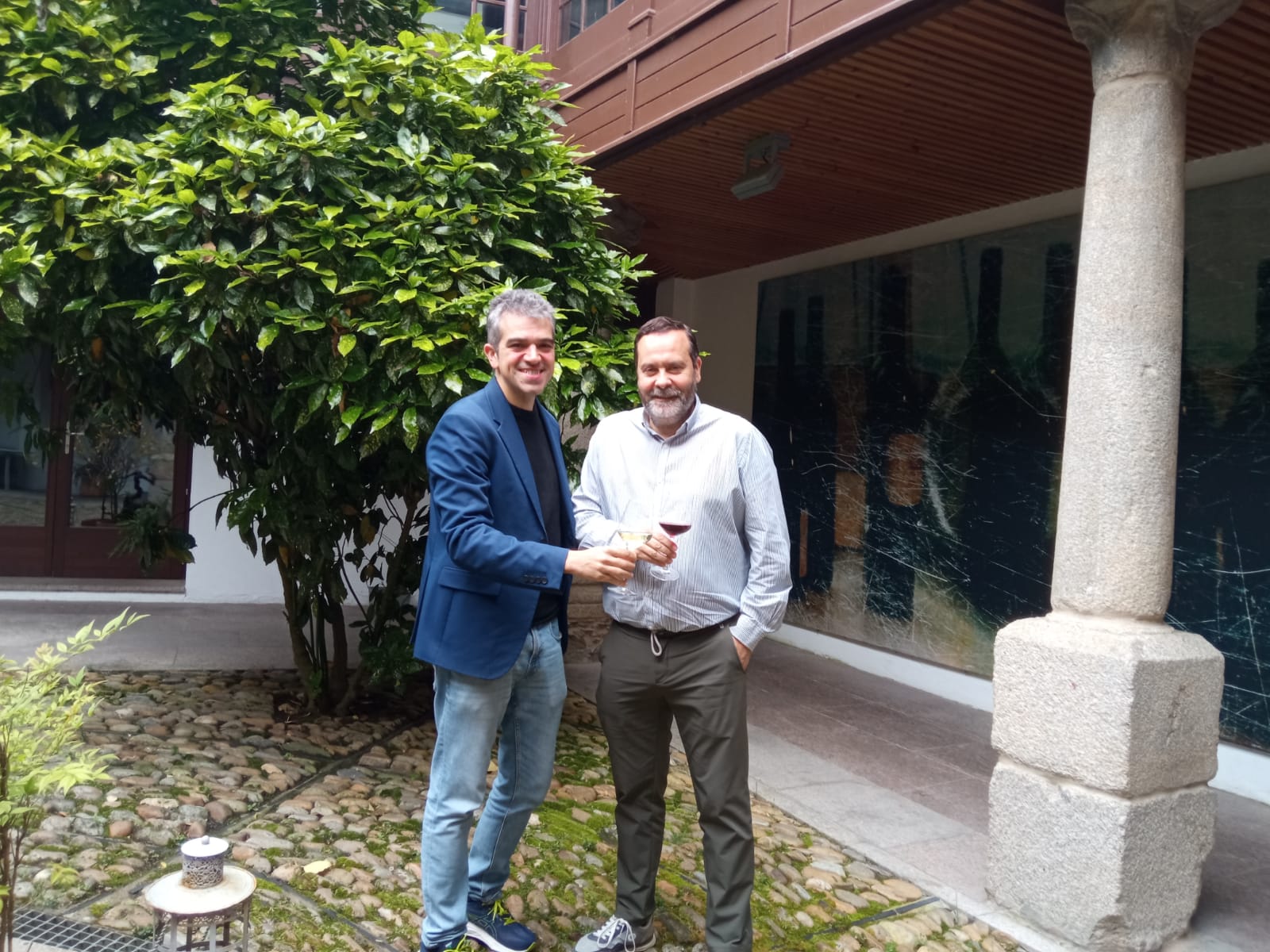
Ferran Centelles highlights the potential of Ribeira Sacra on Jancis Robinson after his blind tasting

The renowned sommelier Ferran Centelles, a regular contributor to Jancis Robinson, one of the world’s most prestigious wine publications, has recently published an extensive article about his visit to the Ribeira Sacra Denomination of Origin. During his stay, Centelles had the opportunity to conduct a blind tasting on May 16, organized by the Consello Regulador. The article, titled Ribeira Sacra - a region in delicate balance, was published on October 7 on the prestigious Jancis Robinson website and emphasizes the uniqueness of the wines from this D.O.
Ribeira Sacra: a dramatic landscape and exciting wines
In his article, Centelles describes Ribeira Sacra as one of the Spanish denominations with the greatest quality potential, praising both its unique landscape and its winemaking tradition. The steep slopes that border the Sil and Miño rivers, with extreme inclinations exceeding 60%, create what is known as heroic viticulture, a considerable effort that, according to Centelles, is reflected in the authenticity and freshness of the wines produced.
The sommelier emphasizes that, although Ribeira Sacra is one of the areas with the most potential, the denomination faces challenges to be addressed. In his analysis, he stresses the need to more clearly differentiate wines by their subzones and to focus on production that values the peculiarities of the terroir instead of concentrating solely on young wines. “Ribeira Sacra has everything it needs to be at the top of Spanish wine,” comments Centelles, who insists on the importance of promoting delicacy in the wines from the Denomination of Origin.
Blind tasting: outstanding quality of the whites and evolution of the reds
During the blind tasting organized by the Consello Regulador, Ferran Centelles evaluated a total of 65 wines from different subzones of the denomination. In his conclusions, he particularly highlighted the progress of the white wines from the D.O., emphasizing their freshness and minerality, with mentions of varieties such as Godello, which he described as “delicate and electric.” On the other hand, regarding red wines, although he praised the evolution of those made from Mencía grapes, he noted that one of the varieties that surprised him most was Brancellao. One of the things Centelles highlights in his tasting notes is the wide variety of grapes found in the Ribeira Sacra D.O., which produces great potential for different elaborations and, in his words, “contributes to a multitude of different wine expressions, and this fact should be exploited and communicated much more.”
A promising future with challenges to overcome
Centelles’ article also addresses some of the challenges facing Ribeira Sacra, including the need to revitalize small family vineyards and promote greater specialization in single-vineyard wines. He believes that the region’s potential lies in its ability to offer delicate wines full of nuance, characteristics that could place Ribeira Sacra among the most prestigious Denominations of Origin in Spain. The region and the quality of its wines drive the Ribeira Sacra D.O. to appeal to an audience seeking quality above all.
As Centelles expresses, “Ribeira Sacra is probably the D.O. with the most spectacular wine-growing landscape in Spain. This spectacular landscape produces some of the most exciting wines in Spain,” adding that “Ribeira Sacra is the region with the GREATEST (and I write it in capital letters with full intention) quality potential and should be among the top three regions in Spain.”
In this sense, he emphasizes that wineries should not be afraid to produce single-vineyard wines. Regarding his visit to Ribeira Sacra, he affirms: “The tendency is to make young wine, which may have great traditional value, but it lacks prestige.” He continues: “According to the ancient Roman saying, Bacchus amat colles (Bacchus loves the hills), the best grapes come from the hills. Well, Bacchus has given them the best he had, but most producers still make young 'drinking' wine, which is currently not only the least valued in the market but also the one with the most somber prospects in consumption trends.”
Regarding the wines and the different subzones in the D.O., Centelles points out in his article: “It would also allow for the establishment of a hierarchy with ‘village wines’ and single-vineyard wines, in the style of Burgundy, as other Spanish denominations of origin have done; this undoubtedly makes sense due to the great heterogeneity of this territory.”
In statements made during his visit to the Consello Regulador, he already affirmed: “We need to enhance the uniqueness even more, for wineries to not be afraid of making single-vineyard wines, which are lacking, and for them not to be afraid of making delicate wines. Delicacy is what has historically been missing in Spain, and Ribeira Sacra has the potential to offer those wines.”
Centelles concludes his article by noting that he visited Ribeira Sacra 11 years ago for the same magazine (Jancis Robinson), and that these 11 years have seen absolute progress that will serve, as he himself writes, “to create a future that ensures Bacchus is proud of his magnificent creation as a wine-growing region.”
Ferran Centelles' visit and his comments underline the crucial role of the Consello Regulador in promoting the quality and differentiation of Ribeira Sacra wines, an effort necessary to ensure a sustainable future for the heroic viticulture of the D.O. and to guarantee its position, as Centelles says, “at the top of Spanish wines.”